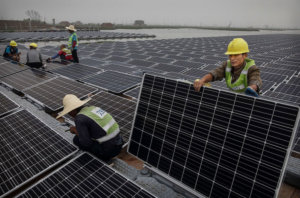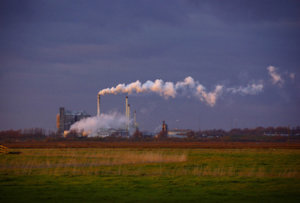Michael Grubb, Professor of Energy and Climate Change at University College London and a grantee of the Institute for New Economic Thinking, co-authored a recent study showing that what many saw as an overambitious goal to keep the earth’s temperature from rising more than 1.5 degrees Celsius may actually be reachable. Climate change deniers quickly pounced, using the hopeful news as an excuse to blame researchers for updating their models and to downplay the climate crisis. Two years after 195 countries signed the Paris Agreement on climate, Grubb explained what the researchers really found and shared with INET surprising developments on global warming, the future of nuclear energy, and why the rest of the climate community isn’t too worried about President Trump.
Lynn Parramore: Let’s talk about the recent study you co-authored that created a media stir. You found that things might be a little better than we thought in terms of the Earth’s temperature rising. Can you explain your conclusions and how they have been spun in the press?
Michael Grubb: Sure. It turns out that we had a longer period than expected where temperatures didn’t rise as fast as the trend of the previous few decades – though they have jumped in the past couple of years. So we updated estimates that were almost a decade old. I do want to emphasize that the difference between what we found and what was widely understood from previous research is small— it shouldn’t have been a massive deal.
Our study in no way means that we don’t have a climate crisis. But we might be slightly better positioned to meet certain goals, like those set forth in the 2015 Paris Agreement, than we thought.
LP: And yet Breitbart and other media outlets shouted that climate scientists “admit they were wrong about global warming.” How do you respond to that? How can scientists combat the misinformation?
MG: Partly it’s a problem of scientists not communicating effectively what they do. They run big, complicated models, and measure the past. Scientists looked at C02 emissions since the Industrial Revolution and made projections based on their findings: For every billion tons of carbon we dump into the atmosphere, the temperature goes up by a certain amount.
Based on those assessments, the people who had been running the big modeling projections, said, ok, if we want to prevent the global temperature from rising more than 1.5 degrees Celsius, then we can have only have so much in emissions—and it looks like we’ve only got a few years left at current emission rates before we pass the limit.
Governments made a deal in Paris based on ‘avoiding dangerous interference’ with the climate system, which included this target of 1.5 degrees Celsius at the ambitious end. A lot of people, including me, were pessimistic about achieving that goal.
The studies had actually presented estimates on temperatures rising within a range, but unfortunately, some in the scientific community succumbed to the demand for a single number. So they chose a number in the middle of the range that the models showed. Where we are today is actually well within the range of the models. We’re just not right in the middle. We have additional information about what’s happened since then and we have slightly different estimates of the way gases other than CO2 contribute to rising temperatures.
LP: So it’s not that scientists got anything wrong. Rather, it’s a matter of previous findings becoming oversimplified in the public discussion and of more information coming to light since then.
Right. Unfortunately, a lot of misleading things have come out in the press, especially Breitbart, which got it all wrong. But this is the basic challenge for science. If you really look at what’s happened in relation to this paper, you see that science is about continually trying to improve your estimates. The political approach being adopted, in contrast, is to say that any attempt to improve anything in your estimation is treated as, “Oh, well, it was all wrong before then!”
How is knowledge supposed to advance if you never improve on what you did before? There’s also a huge challenge about how to effectively communicate uncertainty and complexity.
LP: You actually once stated that the Paris goal of 1.5 degrees Celsius was “incompatible with democracy.”
MG: I did! That was actually my first tweet ever.
LP: That was a doozy. Has anything else happened since that tweet to change your mind?
MG: Yes it has! I was responding to the notion held by many that we could reach the goal technologically if we spent enough quickly enough. Well, of course! But the problem is a political one. It’s a social science problem. Instead of social scientists in this space, we have modelers churning out models with targeted carbon prices and so on, when in reality we can’t get even a small part of it through a political system.
So that tweet was my cri de coeur to say, look, this goal is impossibly ambitious in real countries where people vote and may well object to what we’d have to do. So you’d better start thinking about the social scientific aspects.
Three things have changed since the tweet. First, we now have an approach that indicates we may have about 20 years of current emissions before we blow the 1.5 degree Celsius goal – meaning for example, if we reduce in a slight line from today for 40 years we might do it. Second, to everyone’s surprise, Chinese emissions have stopped growing for the previous two years, and global emissions stopped growing, too. I don’t know if that’s enduring, but it looks like China has shifted and that’s a fantastic development. The third thing is that the cost of renewables has collapsed faster than expected.
I put those three things together, and it’s no longer inconceivable—though still really tough!—to reach certain goals. The Paris Agreement said that avoiding dangerous interference means keeping the global temperature increase well below 2 degrees Celsius (compared to preindustrial levels) and pursuing efforts towards 1.5 degrees. That range is beginning to look plausible and sensible. Even if we reach 1.6 or 1.8 degrees, at least we’ve not gone over 2 degrees. With a tremendous amount of commitment and work and a lot of luck, maybe we could even get to 1.5 degrees, but I’m not going to hang my mast on that. But within the range set out in the Paris agreement? Yes, if we were willing to try.
LP: If we want to make progress on climate change, do you believe nuclear will be a big part of the future? Are there options for clean, abundant energy other than renewables?
MG: I don’t think the signs point to nuclear as the most important option for the future. In Europe, the costs seem to keep escalating and appetite for this (and the risks) associated with nuclear is decreasing.
We need to see how far the renewables revolution goes. While it remains to see how well it works, this may also unleash potential in hydrogen gas, since we can use surplus renewables to produce hydrogen as a fuel by splitting water. It’s also a good way to store energy, which could make renewables more attractive.
LP: How does this process of splitting water to produce hydrogen help solve the problem of storing energy from wind and solar?
MG: When you have a surplus of renewable energy, you really don’t want the wind farm or the solar cells belting out power that won’t be used for anything. So what do you do with it?
One thing you can do is to simply run an electric current through water, which splits the water into hydrogen and oxygen. You then channel the hydrogen into gas grids. Typically you mix it in with methane, which is the standard natural gas.
When the hydrogen burns, water is reformed—you’re basically turning it back into water. It’s just about the cleanest form of energy. And a lot of bang for your buck.
LP: Much of your work has concentrated on practical measures for dealing with climate change. Which countries or regions have done the best in dealing with them? And how successful has the world as a whole been?
MG: The world as a whole not very successful so far, let’s be honest. I would say that the most successful parts of the world have been Scandinavia, then California and northwest Europe. The Californian systems have been pretty good from what I know. Their approach to carbon prices is smarter than the European approach. It sets a price corridor on its emissions trading system that includes border adjustments—that is to say, it takes into account carbon emissions from electricity that comes from out of the state. California might do something similar with imported cement. The state also acknowledges that carbon pricing is only one amongst many elements of its climate change strategy, and that’s dead right.
You can argue about Germany because they have spent a lot of money. They have not gotten emissions down substantially yet, but they have basically broken the back of wind and solar technology, which is of global benefit.
I think Britain has been a bit slower and more cautious but is also doing things more efficiently and getting more results in transforming its power sector, including getting out of coal.
We should also give reasonable credit for the fact that China is storming up the field. I don’t think it’s yet overtaken California or Western Europe, and China is a complicated place with a lot of fights going on. But things look promising.
There are other pockets of interesting places, like some of the Latin American countries—Brazil has been pretty good in a number of areas. In India, Modi seems to be seriously turning the country around in terms of renewable energy ambitions and that could be very big.
LP: What about the situation under Trump? Many are worried that he may bolster older energy sources and fail to commit to renewables. How does the rest of the world react to him in terms of climate?
MG: In the climate change professional community in Europe, there is actually a much more relaxed attitude than you would think because the view is, well, Trump might blather but he can’t stop the demise of coal. It does get worrying if he tries to subsidize coal to keep it alive. But is this his proposition to make American great again? Trying to subsidize coal to stay in the last century’s energy system? That’s a ludicrous position.
We do worry about Trump withdrawing finance from international systems and efforts on climate change—that could be potentially very damaging. These include the United Nations Framework Convention on Climate Change, the Paris Agreement, and the various international funds that made agreements under these deals to help developing countries both adapt to the impacts of climate change and to decarbonize their development.
On transport, Trump could do a lot perhaps to slow down electric vehicles or stop the toughening up of car efficiency standards. But generally I think the feeling is that Trump is actually not going to do much to change the American energy system.
There definitely seems to be an increase in interest and engagement on climate at the state and city level, and these initiatives have been moderately successful in communicating the message, at least to Europe, that the president does not represent the entirety of the U.S.
So on all those grounds there’s a more relaxed reaction. Where I think the real worry comes in is that every country has its skeptics: in particular, there are skeptics in developing countries that have been dragged into the Paris Agreement. That deal was largely designed to satisfy U.S. demands, but Trump withdrew from it, and the developing countries think, wait, the developed countries were supposed to be serious and help to drive down the cost of the technologies and stick to their commitments. But if the U.S. is going to walk away, what are you expecting us to do? That’s the real danger: Trump’s withdrawal is used as an excuse by those who really don’t want to do anything.
LP: What’s your view on climate change and its relationship to rising inequality in the world? How do we tackle this problem?
MG: One thing that is not strong enough in the debate is an understanding of how much climate change could make the world a more unequal place. To an important degree, it’s the poor people who die when you have heat waves and major storm events. Understanding that leads you to focus on the urgent need to help economic development and adaptation, which is precisely what developing countries have said all along.
If Trump withdraws finance from the international system, this exacerbates the potential fact that energy becomes a business where the rich world dumps damage on the rest of the world, particularly the poor, and then refuses to accept any responsibility either for helping them or even to stop killing them through environmental damage.
I think the best ameliorating factor, helped enormously by the solar revolution, is the potential to get cheap, clean power baked in as part of economic development in the 21st century. This is a huge opportunity and potentially a leveler as well.










